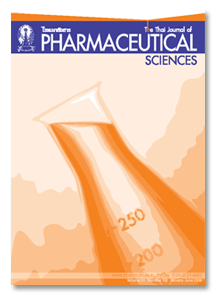ThaiScience
ThaiScience
THE THAI JOURNAL OF PHARMACEUTICAL SCIENCES
Volume 44, No. 01, Month JANUARY, Year 2020, Pages 6 - 13
Poly(lactic-co-glycolic acid) polyethylene glycol copolymer for long-acting injectable synthesis, characterization, and in-vivo study
Ravindra Kamble, Manasi Kulkarni, swati prakash korake, Abhishek Patil, Krishnat Dhekale
Abstract Download PDF
Aim: This work was aimed to develop a carrier system of poly(lactic-co-glycolic acid) (PLGA) by using polyethylene glycol (PEG) for longer action in various diseases by preparing a di-block copolymer by using Risperidone (RSP) as a drug. Methodology: PLGA-PEG copolymer was synthesized, which can be used to prepare nanoparticles like polymeric micelles (PMs) and gets circulated longer time in body. The preparation of copolymer was then confirmed with 1HNMR. Molecular weight was confirmed by mass spectroscopy. The PMs were prepared by single emulsion method. The PMs were characterized for particle size, zeta potential in vitro release, and in vivo study. The results of experiment show that copolymer can be prepared by ring-opening polymerization. Proton nuclear magnetic resonance (1HNMR) and Fourier-transform infrared spectroscopy were consistent with the structure. Results: The entrapment efficiency was around 80%, zeta potential was −0.5 mV, and particle size was found to be 163 nm (±5). RSP release from PMs showed initial burst and then sustained and controlled release. In-vivo studies were done for 7 days in rats and showed extention of 12 folds in half-life of RSP. Thus, PLGA-PEG PMs can be an effective carrier for drug delivery system.
Keywords
Drug delivery, poly(lactic-co-glycolic acid), polyethylene glycol, polymeric micelles, ring-opening polymerization, risperidoneTHE THAI JOURNAL OF PHARMACEUTICAL SCIENCES
Published by : Faculty of Pharmaceutical Sciences Chulalongkorn University
Contributions welcome at : http://www.pharm.chula.ac.th/tjps/
